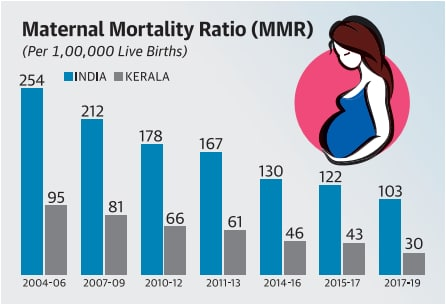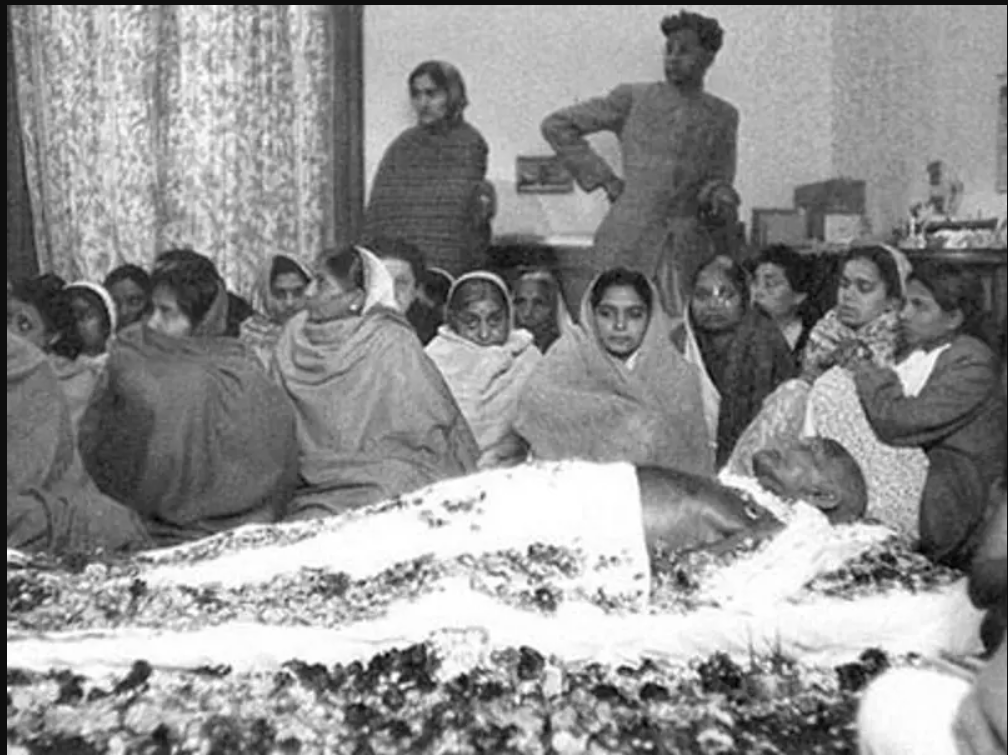Description

Copyright infringement is not intended
Context: Kerala tops in maternal and child health, recording the lowest Maternal Mortality Ratio in the country.
Details:
- Kerala tops in maternal and child health, recording the lowest Maternal Mortality Ratio (MMR) of 30 (per one lakh live births) in the country. Kerala is way ahead of the national MMR of 103.
- According to the latest Sample Registration System (SRS) special bulletin on maternal mortality in India (2017-19), released by the office of the Registrar General of India, Kerala’s MMR has dropped by 12 points.
- According to the date, Kerala has achieved the target based on the U.N. Sustainable Development Goals, of an MMR of 30 by 2020.
About Maternal mortality in India:
- Maternal mortality is the maternal death of a woman during pregnancy or after pregnancy, including post-abortion or post-birth periods.
- Different countries and cultures have different rates and causes for maternal death.
- Within India, reason vary from healthcare access between regions and in socioeconomic factors, accordingly, there is also variation in maternal deaths for various states, regions, and demographics of women.
- Women die as a result of complications during and following pregnancy and childbirth or abortion.
- Most of these complications develop during pregnancy are easily preventable or treatable.
- Other complications may exist before pregnancy but are worsened during pregnancy, especially if not managed as part of a woman’s care.
- India contributes one-fifth of the global burden of absolute maternal deaths.
- 94% of all maternal deaths occur in low and lower middle-income countries.
- India’s present MMR is below the Millennium Development Goal (MDG) target and puts the country on track to achieve the Sustainable Development Goal (SDG) target of an MMR below 70 by 2030.
Steps taken by the Government:
- Janani Suraksha Yojana (JSY) implemented under the National Health Mission (NHM), it is a safe motherhood intervention promoting institutional delivery among pregnant women especially with weak socio-economic status i.e. women from Scheduled Castes, Scheduled Tribes and Below Poverty Line (BPL) households.
- PM Matru Vandana Yojana (PMMVY) Providing Cash incentives for improved health and nutrition to Pregnant and nursing mothers.
- Scheme for Adolescent Girls aims at girls in the age group 11-18, to empower and improve their social status through nutrition, life skills, home skills and vocational training.
- Pradhan Mantri Surakshit Matritva Abhiyan (PMSMA) provides pregnant women free of cost assured and quality Antenatal Care on the 9th day of every month.
- Mahila Swadhar Greh to provide relief and rehabilitation to destitute women and women in distress.
- Ujjawala scheme, a Comprehensive Scheme for the prevention of trafficking and for rescue, rehabilitation, reintegration and repatriation of victims of trafficking for commercial sexual exploitation.
- One-Stop Center (OSC) to facilitate access to an integrated range of services including medical aid, police assistance, legal aid/ case management, psychosocial counseling and temporary support services to women affected by violence.
- Extending Maternity Leave duration From 12 weeks to 26 weeks.
- Surakshit Matratva Ashwasan (SUMAN) aims to provide assured, dignified, respectful and quality healthcare at no cost and zero tolerance for denial of services for every woman and newborn visiting the public health facility to end all preventable maternal and newborn deaths.
- LaQshya aims to improve the quality of care in Labor room and Maternity operation theaters to ensure that pregnant women receive respectful and quality care during delivery.
Way Forward:
- Ensure equal access to Nutrition, Health, and education.
- Need to adopt a Life Cycle approach to empowerment of girls and women.
- Recognise Women’s Reproductive Rights, Focus on Young mothers and adolescent unmarried girls.
- Enforcement of Child marriage prevention programs, Emphasis on safe delivery in institutional set ups.
- Adolescent girls’ programmes should focus on protecting girls from early and unwanted childbearing.
- Encourage young women to delay marriage age by promoting education and skill development.
- Encourage young couples to practice family planning and delay their first child.
- Train Social workers in hospitals, and Community health workers under the national health mission.
- Improve mental health services for women, address stigma, discrimination and violence against HIV‐positive women and female sex workers.
- Address health problems of women in the informal sector, Improve water and sanitation Situation for women.
- Universal availability of maternity benefits and Childcare facilities to all women workers across the organized and unorganized Sectors.
- Flexible designs for the Schemes, depending on local needs and region‐Specific issues.
- Adopt Need‐based Schemes, Pro‐active Publicity of Schemes, Creation of Simple, local language materials to explain.
https://epaper.thehindu.com/Home/ShareArticle?OrgId=G6S9JFEL4.1&imageview=0













